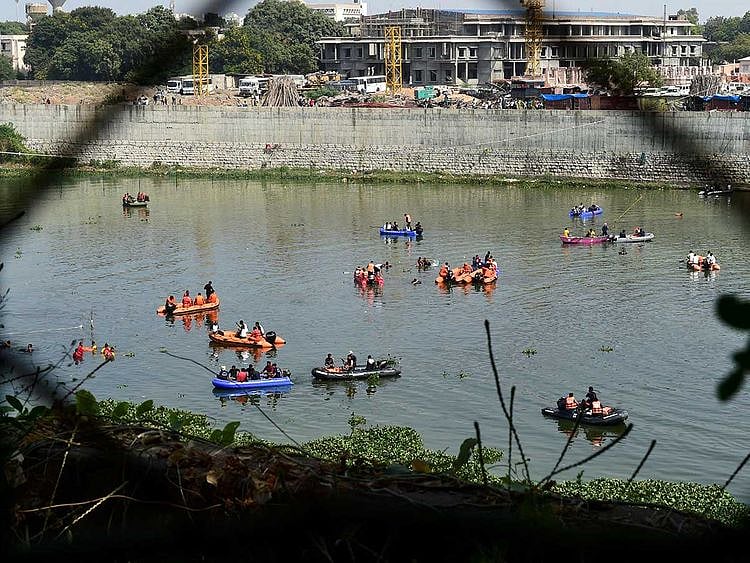Morbi bridge tragedy in India: Who is responsible?
How we handle this tragedy will be the difference between words and intent

Four days. That is all it took to destroy 135 lives as hands flailing and failing men, women and 47 children plunged to their death in Gujarat’s Machchhu river. A newly repaired suspension bridge snapped so callously that for many it was over even before they could make sense of what was happening.
With scores missing and that death count is expected to go up, rescue operations were halted under the whispers of a VIP visit. Nor had the horror subsided before the usual suspect reared its head, a system that has made a mockery of lives by normalising cutting corners.
The newly minted bridge was doing business without a fitness certificate but the culpable chain can be traced further back. How was a company involved in manufacturing watches, electrical appliances and toothpaste, yes you read that right, given the contract of renovating a bridge?
The usual suspects
Two managers, two ticket clerks, two contractors and three security guards — these nine have been arrested as though testing the suffering of fools. The local administration’s flimsy excuse that it was unaware the bridge was open to public is hogwash, with hundreds of tickets sold, this swinging tourist bridge was no silent excursion.
In India, there is always a fall guy and he is usually from the bottom up, an unsuspecting lowly paid employee thrust into the spotlight while real accountability is like a politician’s promise — never fulfilled.
Forget an arrest, the owners of Oreva, the company behind the bridge renovation have not even been mentioned in the FIR and they have now fled. This is why incidents that expose our civic frailties happen at regular intervals, our system always has an escape clause.
Roads that are more puddle than concrete, boats replacing cars in a metro thoroughfare, deadly open manholes, corruption has desensitised a population that is accustomed to a bumpy ride. Five days after its inauguration, a portion of the road on the Bundelkhand Expressway caved in due to heavy rain.
A flyover in Gurgaon didn’t even wait for construction to be completed before it collapsed and so, it goes on and on. A man-made tragedy is always waiting to happen or just happened.
British-era bridge
The British-era Morbi bridge had held on for 150 years, was there even a need to tinker with it or was this simply part of an obsession to obliterate everything from the colonial times while paying such a high cost for it?
A tragedy however big it is — and it gets more complicated the more overpowering it is, isn’t independent of our famed bureaucracy that finds just the moment to clean up its act. The hospital in Morbi that should have been busy saving lives of those injured in the calamity was instead busy sprucing up for the PM’s visit. A man searching for his missing niece got no answers from the otherwise busy hospital.
The Gujarat government is conspicuous in its silence and no leader has admitted responsibility. But then these are not men of the stature of Lal Bahadur Shastri who immediately sent his resignation in the aftermath of a train accident that killed 144.
On the contrary when there is tragedy, can politics especially in the election season be far behind? Old videos showing people shaking the bridge were circulated as recent ones and brazen attempts were made to accuse the public themselves for the catastrophe, no different from blaming the five thousand deaths in India’s open manholes on the victims themselves.
Also Read
Sajid Khan on Bigg Boss: India just lost its #MeToo battle Cough syrup, deaths and Indian pharmaIndia: Pollution is back, so is the political blame gameDiversion making headlines
In South Korea there is public outrage over the death of 150 people in the Halloween stampede barely days earlier. Answers are being demanded from the government and police as the country plunged into national mourning cancelling everything from concerts to official events with the government apologising to its people.
Contrast with Gujarat, where a tragedy of similar proportions did not stop election campaigning and birthday celebrations of a state minister. After the whitewashing of the walls and otherwise, soon it will be business as usual. Diversion making headlines have already started.
In 2016 a bridge collapse in West Bengal was used to score political points, hopefully this time human life will be respected. Rahul Gandhi’s statement on not politicising the tragedy is admirable, but opposition needs to ask hard questions, again and again for accountability to be fixed.
How we handle this tragedy will be the difference between those words and intent. Otherwise we remain like little people in a miniature game of Lego, moved at will in a system that remains unmoved.
Network Links
GN StoreDownload our app
© Al Nisr Publishing LLC 2026. All rights reserved.